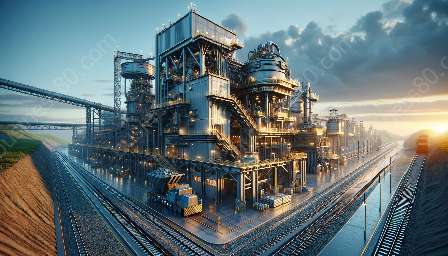Electrolysis is a fascinating process that plays a pivotal role in the extraction of metals such as aluminum. It involves the use of electrical energy to drive non-spontaneous chemical reactions, leading to the production of pure metals essential in various industries. The utilization of electrolysis in aluminum mining and the broader metals & mining sector is an intriguing topic, shedding light on the technical, economic, and environmental aspects of this technique.
The Basics of Electrolysis
Before delving into its applications in the mining industry, it is essential to understand the fundamental principles of electrolysis. The process involves the decomposition of a compound through the use of direct electric current. This results in the migration of ions, leading to the formation of new substances at the electrodes. Electrolysis is governed by Faraday's laws of electrolysis, which dictate the quantitative relationship between the amount of substance produced and the quantity of electricity passed through the electrolyte.
Key Components of Electrolysis:
- Electrolyte: A substance that conducts electricity when molten or dissolved in water. It provides the source for the ions to undergo redox reactions.
- Electrodes: Conductive materials, usually made of metals, that facilitate the flow of current into and out of the electrolyte.
- Power Source: Typically a direct current (DC) power supply that drives the electrolysis process by providing the necessary electrical energy.
Applications in Aluminum Mining
Aluminum is a widely used metal in various industries, including transportation, construction, and packaging. The extraction of aluminum from its ores, such as bauxite, relies heavily on the electrolysis process. The Hall-Héroult process, developed simultaneously by Charles Martin Hall and Paul Héroult in the late 19th century, revolutionized the production of aluminum and continues to be the primary method used today.
The Hall-Héroult Process:
In the Hall-Héroult process, aluminum oxide (Al2O3) is dissolved in molten cryolite, an electrolyte. The dissolved aluminum oxide undergoes electrolysis, leading to the deposition of pure aluminum at the cathode and the release of oxygen at the anode. This efficient and cost-effective method enables the large-scale production of aluminum, contributing significantly to the global supply of this crucial metal.
Impact on Metals & Mining Industries
Beyond its specific application in aluminum mining, electrolysis has a broader impact on the metals & mining industries. Many other metals, including copper, zinc, and magnesium, are extracted using variations of the electrolysis process. The ability to obtain high-purity metals through electrolytic refining is essential for meeting the stringent quality requirements of modern industrial applications.
Electrolytic Refining:
Electrolytic refining is a common technique employed to purify impure metals obtained from traditional mining processes. It involves the use of electrolysis to selectively remove impurities such as copper, lead, and tin from the desired metal. This results in the production of high-quality, commercially viable metals that meet the stringent standards set by various industries.
Environmental Considerations
While electrolysis offers numerous benefits in terms of metal extraction and refining, it is important to consider its environmental implications. The energy-intensive nature of electrolysis, especially in aluminum production, requires substantial electricity consumption, leading to carbon emissions. Efforts are ongoing to develop more sustainable methods, including the exploration of alternative power sources and process optimization to reduce the environmental footprint of electrolytic processes.
Furthermore, the proper management of electrolyte waste and the disposal of by-products from the electrolysis process are critical considerations for sustainable mining and metal production practices. Establishing efficient recycling and waste management systems is essential for minimizing the environmental impact of electrolysis-based metal extraction.
Conclusion
The electrolysis process stands as a cornerstone of modern metal extraction and refining operations. In the context of aluminum mining and the broader metals & mining industries, electrolysis continues to drive innovation, enabling the production of high-quality metals essential for countless industrial applications. As the industry evolves, the development of sustainable electrolytic processes and the responsible management of associated environmental challenges will be paramount to ensuring the continued success of electrolysis in the mining sector.

